By Gerald Minack, a former global equity strategist for Morgan Stanley. Cross posted from MacroBusiness
Rising political polarisation in the US has gone hand-in-hand with rising income inequality, falling top-end tax rates, lower taxes on business, rising leverage and higher asset prices. These trends may be coincidental, but they seem to reinforce each other. The medium-term risk is that some of these trends reverse, as occurred after the 1920s.
Congressional political polarisation and income inequality in the US are at multi-decade extremes (Exhibit 1). The polity is split; incomes are unequal.
The rise in polarisation partly reflects electoral gerrymandering that has sharply reduced the number of contestable seats (Exhibit 2). Only 20% of House of Representatives seats would change hands on a 5% swing. This increases the centrifugal influence of the party members who dominate the increasingly-decisive party primary elections.
However, rising political polarisation pre-dates the decline in contestable seats: it started as incomes became more unequal. Inequality has not risen because the rich got richer faster than the poor. It increased because the income gains of the past 30 years have gone to the top 1%. Average income for the bottom 99% is now unchanged in real terms over the past 40 years (Exhibit 3). The rising tide did not lift all the boats: it floated a few yachts.
In 2012 the highest-paid 1% earned 21½% of total income, according to academic Emmanuel Saez (http://elsa.berkeley.edu/~saez/). This is the highest share since the 1920s. The lift in top-end income mainly reflected a rise in business income and salary payments. Exhibit 4 shows the source of income for the highest paid 0.1%, as a percentage of total US income. The income share of the highest paid did not increase just because capital has done better than labour: it also reflects the increase in the share of salaries going to the highest paid.
Several factors contributed to wage inequality. The increased supply of unskilled (Asian) labour damped low-skilled wages in developed economies (but increased wages in emerging economies). Rising inequality was also correlated with the rise in the relative pay of workers in finance (Exhibit 5).
The rise in financial pay also was associated with the rise in economy-wide leverage (Exhibit 6). This was similar to the 1920s. Both periods saw important technological innovations and large credit booms. The technological improvements in the 1920s were far more important than those of the past decade or two, but the modern credit boom far out-stretched its 1920s predecessor.
The rise in inequality now – as in the 1920s – has also been associated with a significant decline in tax rates on high incomes. Exhibit 7 shows the share of income going to the top 10%, and the top statutory income tax rate (inverted, so the line goes up as the rate goes down). The highest marginal rate was last below 40% in the 1920s. (Note one difference, however: the top rate now cuts in at an income of just under $400,000. In 1921 the top rate cut in at an income of over $13,000,000 in today’s prices.)
The increase in capital income has been assisted by the rise in profits as a share of GDP. This rise reflects rising pre-tax profits and falling average effective tax rate paid by business (Exhibit 8).
All these trends were favourable the owners of financial investments and for people working in the investment industry. Neither has had it this good since the 1920s. This cycle, like the 1920s, could have ended in a depression. Instead, aggressive policy response of central banks seems to have added another leg to the cycle. However, pushing these trends to historical extremes may start to cause problems for investors, as illustrated by the debt ceiling imbroglio. More to the point, it seems plausible that these trends will reverse, at some stage, to the detriment of financial assets.
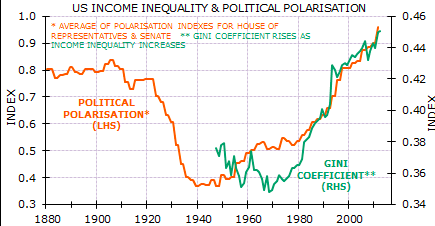
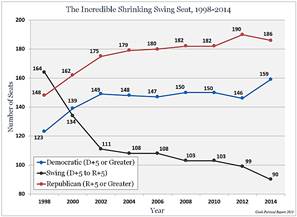
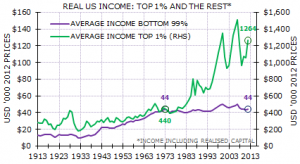
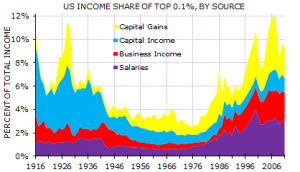
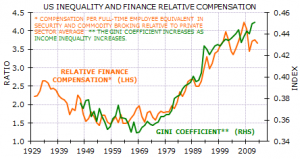
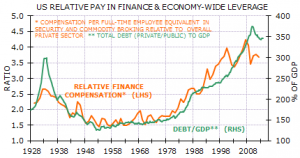
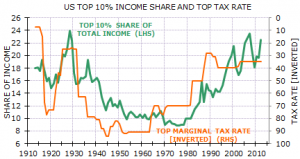
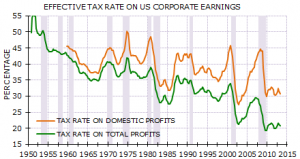


“The rising tide did not lift all the boats: it floated a few yachts.”
Listen son, said the man with the gun
There’s room for you inside
Down and Out
It can’t be helped but there’s a lot of it about
With, without
And who’ll deny that’s what the fightings all about
Get out of the way, it’s a busy day
And I’ve got things on my mind
For want of the price of tea and a slice
The old man died
http://www.youtube.com/watch?v=iSOzE1DUwK8
Is that “Rising tides” comment the one the Labour Party’s Ed Miliband recently, or did he plagiarise it?
Some of us have never missed a floyd, even at Berlin’s wall;
http://www.youtube.com/watch?v=GjCVJUfblZk
I think the rich are getting richer even faster than this study suggests. I don’t see anything about stock option gains, for example, or capital gains either.
About the only thing that is better now than it was forty years ago is the absence of a military draft. Wonder when they will restore that?
Make that fifty years ago.
Time flew. I guess when MacroBz prints this, nobody can argue the demerits of our way of military capitalism. But they are all so expert at ignoring these things. Now all that’s left to do is the inflation of assets and the devaluation of the dollar. So QE away! I confess I watch Larry Kudlow and lately he’s been talkin lots a smack. Last nite he bemoaned the lower value of the dollar, but only briefly – he never gets into the analysis. Which analysis is that this is controlled inflation for assets to offset the lost value of the dollar so that all the rich interests don’t lose out. Larry and his guests have been trying to introduce a new meme: Extolling the virtues of Calvin Coolidge. You can’t make this stuff up.
remembrances-“military capitalism”:
http://www.youtube.com/watch?v=jk7-SSFmUIs
Doubt the draft will be restored. The navy and air force need long term enlistment, because a lot of their work requires some technical skill. We don’t need a large land army, because we don’t have any enemies who have large conscript army. The surveillance state employs lots of people. I think this surveillance will be turned on dissidents in our own country. On a small scale, the government sometimes creates terror threats. Wonder, if these programs will get larger
its a different kind of ‘establishment’…example:
“Obama’s recently announced “Asia pivot” signals that East Asia will be at the center of the explosion of lily-pad bases and related developments.”
http://www.tomdispatch.com/archive/175568/
agree, the home front will expand…gota protect those yacht owners
They may need a large land army to keep order right here.
Ya, Freedom Police.
Then the military is our government jobs program and is equal opportunity too – if the economy is crappy and you can’t find a job anywhere. ‘cept for age discrimination, but maybe the “left” will fix that problem sometime soon.
Plus, you can get partial college tuition after only 4 years of service – so helps defray the high cost of your first, or second, education as you continue to fine tune your efforts to train the perfect you that may finally fit some employers job spec. (before you get too old)
What “crazy boy” said:
http://www.youtube.com/watch?v=y6efssifN9U
Iran has a large army, but we’ll never tangle with them because they can fight and inflict politically inconvenient significant casualties.
If the social welfare state breaks down or is taken away–SS, SSI, Welfare, Unemployment insurance, then as spade said, I could see our army turned on us.
I’d love to see the draft re-started, but only if the chances of being drafted are directly proportional to your parents’ income. Guess what? War is over.
Vietnam era, famous Dick Gregory speech-“If they came to draft the family dog,
all of a sudden there’d be a lot of families without any dog….but you’ll let them draft your son!?”
It seems to me (a non-American) that the US military is doing fine with recruiting on a voluntary basis. As living standards fall, more and more young people will find enlistment which offers 3 meals a day, accommodation and clothing a better alternative than misery in civilian life.
I doubt if the US will reintroduce the draft in any universal form. One of the lessons the US military learned in Vietnam was “Don’t draft middle-class white boys”.
Mr. spade;
(How’s Miles by the way?)
As Americas experience in Vietnam showed, a draft army can be a two edged sword. Lots of revolutions have arisen from the ranks, usually led by junior officers. An example would be the Nasser coup in Egypt. Americans proved in the Vietnam embroglio that a halfway educated conscript army can turn quietly but surely against the aims of its leaders. (Check out the history of “fragging” in the recent Indochina affair. Skippy, did you see any of that when you were there? Correct me if I am wrong.)
Threats to the – group – go bye bye – one way or another, again a two edged sword as evidenced in the stans.
These figures also do not include off the off-the-books illegal economy that accounts probably for 20% of global GDP.
We didn’t start it, but we can finish it!
“Why else would we allow our country to be destroyed? Why else would we be rewarding its destroyers? Why else would we all—by proxies we have given to greedy corporations and corrupt politicians—be participating in its destruction? Most of us are still too sane to piss in our own cistern, but we allow others to do so and we reward them for it. We reward them so well, in fact, that those who piss in our cistern are wealthier than the rest of us. How do we submit? By not being radical enough. Or by not being thorough enough, which is the same thing.” Wendell Berry
http://www.truthdig.com/report/item/lets_get_this_class_war_started_20131020/
Outstanding quote.
It fits nicely with an earlier article by Chris Hedges a few days ago on common dreams —> called Let’s Get This Class War Started http://www.commondreams.org/view/2013/10/21
Hedges finds eloquent words:
“There are only two or three human stories”, Will Cather wrote, “and they go on repeating themselves as fiercely as if they had never happened before.”
Demoralizing, defeatist garbage. The only reason to read Hedges is masochism.
Respectfully, I disagree.
I showed my consumer education class the recent hour long interview with Hedges on Bill Moyers where Chris was discussing Sacrifice Zones.
“Sacrifice zones” are areas in our country that resemble third world countries: Immokalee, FL; Pine Ridge, SD; Welch, WV; and Cambden, NJ. This interview about his work on his book Days of Destruction, Days of Revolt was a seminal experience for 50 of my students to understand how poverty, income inequality, racism and externalities affect local communities and families here within 300-1000 miles of where they live. Students reported that this video has a significant impact on how they saw their own community as well as country (feeling like they were in the dark about what is happening).
Lastly, while I agree Hedges’ readings can lead one to feel demoralized, I would argue that his agenda to break through the static noise of false comfort. I would hazard a guess that Hedges believes is not good enough for Americans to sit on their assess and do nothing (probably why he is suing Obama and getting arrested in sit-ins).
And who said that we were supposed to feel energized and fired up about this. What is happening here in America is some serious shit. Okay, I am done venting. We need what Hedges has to offer and our own individual responses may fall where they may.
John Mc, Your my kinda teacher…Vent on as needed.
“We’ve bought into the idea that education is about training and “success”, defined monetarily, rather than learning to think critically and to challenge. We should not forget that the true purpose of education is to make minds, not careers. A culture that does not grasp the vital interplay between morality and power, which mistakes management techniques for wisdom, which fails to understand that the measure of a civilization is its compassion, not its speed or ability to consume, condemns itself to death.”
~Chris Hedges, Empire of Illusion: The End of Literacy and the Triumph of Spectacle
“We need what Hedges has to offer and our own individual responses may fall where they may.”
But we don’t need individual responses. We need organized responses.
It wouldn’t be so bad if Hedges didn’t write with this morose, drawn-out style that seems to wallow in a pit of whatever his topic is. It’s pure pathos, written by and for people who have the privilege of considering the evils of the world as one studies a piece of artwork- in other words, separated from it.
RanDomino,
I would refer you to AbyNormal’s quote below. I do not consider writing, words, or meaning to be luxuries of one class. There are lessons to be gleaned.
However, the reactions of reader in accumulating these lessons are very individual. I make meaning from Hedges’ work in a number of ways:
1) His seriousness belies commitment & personal experience
2) He speaks truth to power articulately & comprehensively
3) His references and reading list are extensive
A few examples are: Sheldon Wolin, Chomsky, Reinhold Niebuhr, I.F Stone, Hannah Arendt, Joe Stiglitz, Herman Melville, Willa Cather. This leads to greater knowledge and background, which are critical investments for future progessive leadership.
Lastly, I am not trying to convince you to be more like me in my enjoyment of Hedges. I understand that he may be better for some in small doses. However, I am saying that his tone is purposeful, and his content is useful beyond the morose luxury criticism you bestow.
I think you must be reading Hedges second-hand.
seriously, masochism is all you walk away with?
“Nothing sharpens sight like envy”
.
“Those who fail to exhibit positive attitudes, no matter the external reality, are seen as maladjusted and in need of assistance. Their attitudes need correction. Once we adopt an upbeat vision of reality, positive things will happen. This belief encourages us to flee from reality when reality does not elicit positive feelings. These specialists in “happiness” have formulated something they call the “Law of Attraction.” It argues that we attract those things in life, whether it is money, relationships or employment, which we focus on. Suddenly, abused and battered wives or children, the unemployed, the depressed and mentally ill, the illiterate, the lonely, those grieving for lost loved ones, those crushed by poverty, the terminally ill, those fighting with addictions, those suffering from trauma, those trapped in menial and poorly paid jobs, those whose homes are in foreclosure or who are filing for bankruptcy because they cannot pay their medical bills, are to blame for their negativity. The ideology justifies the cruelty of unfettered capitalism, shifting the blame from the power elite to those they oppress. And many of us have internalized this pernicious message, which in times of difficulty leads to personal despair, passivity and disillusionment.”
~Chris Hedges
I am grateful you took the time and energy to post this. I think this quote speaks to the power of the pen and how its meaning can transform how we see one another.
AbyNormal, I am grateful you exist.
I’m not saying we need to be delusional, just strategic. We can’t go on being torn between people who insanely claim that the revolution is just around the corner, and those who can’t seem to move past how bad things are. Faith isn’t a plan, and neither is despair.
What’s defeatist is letting the criminal elite destroy our lives.
We’re not “letting” them get away with it, as if it’s a matter of moral strength.
I just would hate to be one of them when the people have nothing left to lose and remember when it was different and who took it all from them.
Yes, yes, shake your tiny rage-filled fists. The elite are terrified, probably.
Americans have been conditioned by the best PR/propaganda/advertising regime the world has ever known. Every bit of social- and neuro-science research has been combed to come up with methods to control the minds of the population and it has worked fairly well. This mind-control regime, carefully crafted by the most creative and inventive minds in the world, is a marvel to behold and has been able to convince people that up is down and down is up.
But, at some point, in every system we reach the law of diminishing returns and I think the reason for NSA spying, recruiting socio-paths into the security services and so on is because this regime is losing steam for a variety of reasons and people are waking up in their own way. New myths are being created in the underground, on the internet, on talk radio, on cable that will contribute to the dissolution of the conventional wisdom. That change is coming a little bit on the left and a lot on the right. The fact many people were willing to crash the economy to put a stop to business as usual, the fact the public resisted the Syria war when the mainstream media pulled out all the stops to drum up war means we are under a new dispensation and headed towards a very bumpy ride for everyone.
The ones doing the mind control also have a mind. Somehow, those in control always forget that they are part of the system and not outside of it.
They’ll probably end up quite surprised.
No kidding Batman!
Come over to the UK and start posting on the Guardian or provincial newspapers – I’m dumbstruck by how dumbstruck my own peers are, even in predominately left-leaning voting districts, if I point out a few home truths about “memes”, “narratives” and imported US terms now being turned against those on Social Security – the UK has never had Social Welfare by the way, I get my arse kicked from here to Timbuktu.
I’m now being accused of being a Marxist for pointing out that we have a neoliberal economic system and governance, pointing out that present US and UK monetary policy is aiming purposely for a 7% unemployment rate, and that many of our neoliberal economist friends believe this to be the “New Normal” in terms of combating wage inflation and maximising growth, well growth for their wallets, the rest of us get to stave.
Its really quite unsettling and disconcerting that so many have been propagandised against for so long that they are effectively economically slitting their own wrists whilst blaming all and sundry on benefits scroungers and immigrants.
I thought the USA was rightwing and backward, but compared to those in the UK, its a bastion of common sense and tranquility.
“Its really quite unsettling and disconcerting that so many have been propagandised against for so long that they are effectively economically slitting their own wrists whilst blaming all and sundry on benefits scroungers and immigrants.”
Well put.
The answers we seek may be here.
Frank Zappa – Who Are The Brain Police?
http://www.youtube.com/watch?v=DuABc9ZNtrA
Frank Zappa – Illinois Enema Bandit
http://www.youtube.com/watch?v=sCTzgATx09o
Love me some Wendell…much of what he wrote 20 years ago has proved prophetic. If only we would listen to his sage advice.
Great recent interview with Wendell Berry from Bill Moyers that is probably still up on his web site. Berry did a sit-in at the Kentucky Governor’s office protesting environmental damage both to the land and to food.
Greenspan was quoted in yesterday’s WSJ as saying that the way to reduce income inequality is to increase H1B visas for high skills immigrants, so Americans with good paying jobs will have their pay cut!
What’s the name of that article I can’t find it.
Thanks
It’in the review of Greenspan’s new book
Gerald Minack said:
I don’t know why Minack has to tarnish an otherwise insighful post with fact-free nonsense like this.
The forced urbanization with the use of extremely violent and coercive means, the driving of rural populations in “emerging” countries off the land to 1) gain control of the land; and 2) provide a surfeit of slave-wage labor for industry; is no secret. Aruhdhati Roy and many others from the “emerging” or “developing” countries have written extensively on the phenomenon.
It is all part of the neoliberal (what used to be called liberal) project.
Then the neoliberals come out and say things like this, which Minack mindlessly parrots: “Workers in the developed countries must accept lower pay so workers in the developing countries can make more.”
For me, this is the biggest lie of some very big lies which the neoliberals tell.
Take Mexico, for instance. Since 1982 when neoliberalism first began to be forced on the Mexican under-classes, the purchasing power of the minimum wage has fallen 71.3 percent. That of the wage of the average union worker has fallen 50%.
http://www.jornada.unam.mx/2011/07/17/economia/024n1eco
According to what Roy writes, and reports like the following link, workers in India and China have fared no better, and their plight may even be worse than that of Mexican workers:
But left-wing academics in the US like Minack live in their Ivory Towers. For them, anything that happens outside the borders of the Untied States just doesn’t happen. It isn’t important enough to even be considered in their lofty analyses, other than to mindlessly repeat neoliberal tautologies.
I think it all goes back to something George Orwell wrote:
When the revolution comes, it will not begin in the Anglosphere.
Clever use of Orwell here.
We need a list of the Top 100 Liberal Hypocrites!
I will serve up one right away this morning after reading his disingenuous article on inequality (and plan to see his movie this afternoon), but his understanding of neoliberalism is very limited.
100. Robert Reich
99. Matt Damon
The revolution has already started to bud in the middle east and other countries but for the reasons cited in the Orwell paragraph, people do not see it.
Middle-East destabilization does not represent “revolution”-rather, “Confessions of An Economic Hit Man” exploitation by Shock Doctrine…
George HW Bush; “If we had removed Saddam Hussein, we would have destabilized the Middle-East.”
George W Bush; “We fight them there so we don’t have to fight them here.”
(message); we fully intend to destabilize the Middle-East: for profit.
This is very important fM and is a major dilemma facing us all. Most Americans materially benefit from globalization through the opportunity to buy inexpensive products. Thus a “progressive” would favor policies that would encourage more of the same which in turn create the sorts of conditions you describe. Perhaps India, China and other countries producing most of the goods we consume need to go through the dramatic dislocations you describe, as the West did, to become great industrial powers–as if that was some kind of heroic goal worth the cost.
Personally, I believe there is a strong case to be made for globalization and neo-liberalism but I don’t buy it. Why? Because I believe that we have upset not only the balance of Nature but our own nature as well. We cannot pursue radical the radical selfishness implicit in a consumer culture and expect to do anything but kill our spirituality and our sense of connection with each other and the natural world which is, in my view, the most pleasurable and healthy feeling possible for humans.
Banger,
Fellini’s “Satyricon” is travel logue of Rome, circa 500b.c. Fellini’s “Roma” is travelogue of Rome, circa 1940. Comparing the two, humans perpetrate the same “humanity” over and over again, generation to generation. (“Finnegan’s Wake”-James Joyce)
BUT, today, humanity is about to leap into techno humanity-part human, part technology, inside human beings. Biological computer chips are a reality. Actual, physical, Implanting of technology will become reality.
Friend at U.W.-Professor of Biology-gene splicing was placed with neurosurgeon over 2 years-project-“see what you come up with, crossing over
technologies.”
Result; “You didn’t come up with what we were searching.”
Questions; Who has power, money, to devote 2 full-time professors to technological abstraction?
How do professors know what was done with what they did “come up with”?
How do professors know they didn’t come up with what was being sought?
Hey Banger, I think you’ve made an error in exaggerating the role of cheap imports from places like China and India. The majority of the US economy is actually domestic trade. Unlike major exporters such as China and Germany, international trade isn’t very important to our economy. And of what we do trade, a significant portion is with countries in North America and Europe.
Consumerism and cheap crap from China is largely a distraction, a way to appeal to racism and xenophobia (not to mention victim-blaming) by those who wish to deflect blame from the domestic system of political economy that enables concentration of wealth and power.
In spite of the ingenious methods devised by statesmen and financiers to get more revenue from large fortunes, and regardless of whether the maximum sur tax remains at 25% or is raised or lowered, it is still true that it would be better to stop the speculative incomes at the source, rather than attempt to recover them after they have passed into the hands of profiteers.
If a man earns his income by producing wealth nothing should be done to hamper him. For has he not given employment to labor, and has he not produced goods for our consumption? To cripple or burden such a man means that he is necessarily forced to employ fewer men, and to make less goods, which tends to decrease wages, unemployment, and increased cost of living.
If, however, a man’s income is not made in producing wealth and employing labor, but is due to speculation, the case is altogether different. The speculator as a speculator, whether his holdings be mineral lands, forests, power sites, agricultural lands, or city lots, employs no labor and produces no wealth. He adds nothing to the riches of the country, but merely takes toll from those who do employ labor and produce wealth.
If part of the speculator’s income – no matter how large a part – be taken in taxation, it will not decrease employment or lessen the production of wealth. Whereas, if the producer’s income be taxed it will tend to limit employment and stop the production of wealth.
Our lawmakers will do well, therefore, to pay less attention to the rate on incomes, and more to the source from whence they are drawn.
Written around 1925
Laborers knowing that science and invention have increased enormously the power of labor, cannot understand why they do not receive more of the increased product, and accuse capital of withholding it. The employer, finding it increasingly difficult to make both ends meet, accuses labor of shirking. Thus suspicion is aroused, distrust follows, and soon both are angry and struggling for mastery.
It is not the man who gives employment to labor that does harm. The mischief comes from the man who does not give employment. Every factory, every store, every building, every bit of wealth in any shape requires labor in its creation. The more wealth created the more labor employed, the higher wages and lower prices.
But while some men employ labor and produce wealth, others speculate in lands and resources required for production, and without employing labor or producing wealth they secure a large part of the wealth others produce. What they get without producing, labor and capital produce without getting. That is why labor and capital quarrel. But the quarrel should not be between labor and capital, but between the non-producing speculator on the one hand and labor and capital on the other.
Co-operation between employer and employee will lead to more friendly relations and a better understanding, and will hasten the day when they will see that their interests are mutual. As long as they stand apart and permit the non-producing, non-employing exploiter to make each think the other is his enemy, the speculator will prey upon both.
Co-operating friends, when they fully realize the source of their troubles will find at hand a simple and effective cure: The removal of taxes from industry, and the taxing of privilege and monopoly. Remove the heavy burdens of government from those who employ labor and produce wealth, and lay them upon those who enrich themselves without employing labor or producing wealth.
Written around 1925
A lil bitching about the grafics sizes. They are really, really tiny and stay that way when being clicked.
Ok for most you can go really up close to the monitor but the second one for example is to small even for the font to be readable.
“Rising political polarisation in the US has gone hand-in-hand with rising income inequality, falling top-end tax rates, lower taxes on business, rising leverage and higher asset prices. These trends may be coincidental, but they seem to reinforce each other. The medium-term risk is that some of these trends reverse, as occurred after the 1920s.”
Gag me with a spoon! The risk is that **none** of these trends reverse.
The system is completely broken. It’s the end of the end game for mercantilism. But there is no need to curl up and die. My favorite pipe dream is that the NSA is getting the dirt on the financial industry and Homeland Security is gonna storm the gates of their “corporations” any day now. But maybe not. At any rate there are solutions. Adaptations. The best thing we could do, for starters, is to use the US military to a good end. We have spent a century of wealth, both measurable and immeasurable, building up an institution that is unbelievably high-powered and now has no place to go. Let’s retool the military and use it to clean up all the pollution on the entire planet. Let’s start with the Navy and clean up the Pacific. We can use the Army to clean up land pollution. Let’s use it. Not waste it. The civil war in the Middle East is a threat to the status quo, but we cannot solve it.
If every person on the planet received an income not based on labor (productivity) but on their fair share of the earth itself we could put a stake in the heart of this rotten system.
We should legalize drugs and criminalize poison profiteers like Monsanto.
We should fund education and useful innovation which provide the most social value.
But nobody seems to want a world that actually functions.
So many Americans having been raised on two-hour tales with the standard dramatic form and all neatly tied up at the end with a happy face, it’s not very surprising that they aspire to remake their world according to the Save the Cat! beat sheet.
The Archdruid is on to something with his Less Energy, Stimulation and Stuff lifestyle.
Banger stated:
“…I don’t buy it. Why? Because I believe that we have upset not only the balance of Nature but our own nature as well. We cannot pursue radical selfishness implicit in a coarse culture and expect to do anything but kill our spirituality and our sense of connection with each other and the natural world which in my view is the most pleasurable and healthy feeling possible for humans.”
Is this sense of connection with each other and the natural world an endorsement of a type of supposedly natural goodness in all of us close to what is articulated by, say, Rousseau?
Or are you implying that this sense of connection only seems to emerge through certain types of spiritual practice?
It’s not just a subjective feeling on my part. It’s the essence of modern neuro- and social-science. We are hard-wired for connection. That’s why people love MDMA–if encourages them to tune into that connection feeling perhaps having something to do with the vagus nerve which some neuro-scientists connect with feeling love. Am I wrong or isn’t love the greatest feeling? Our mistake is that we connect it to a particular special person but really love is something bigger.